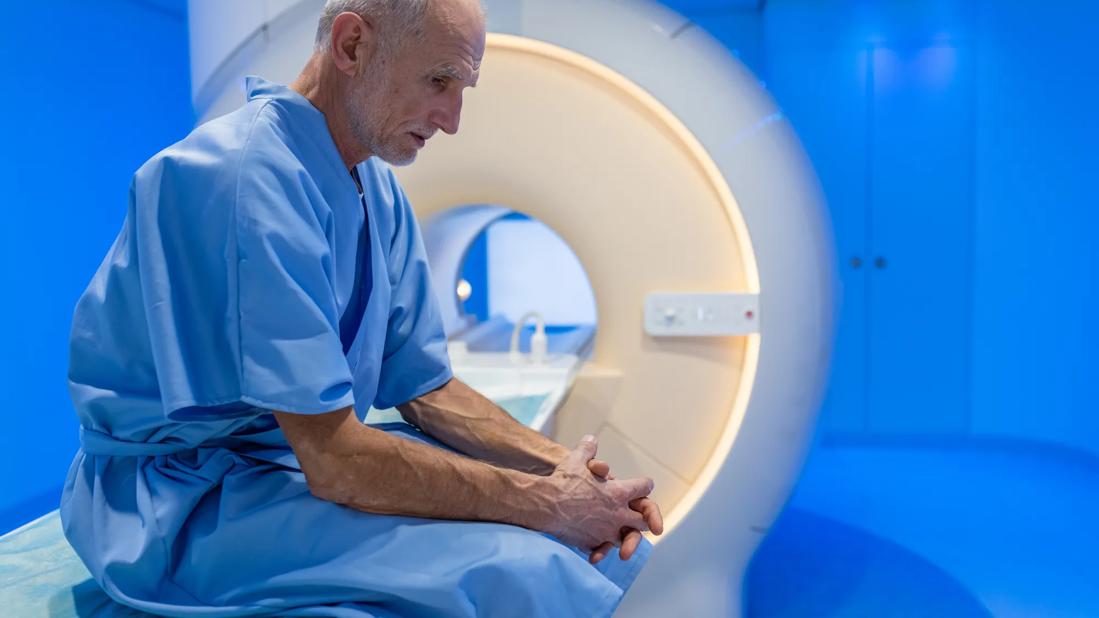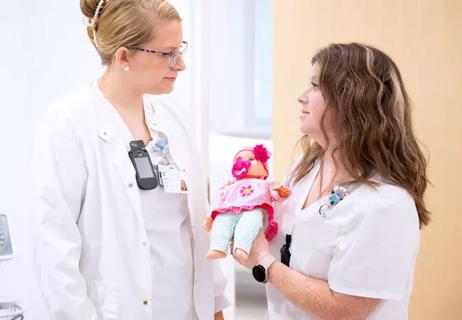Patients benefit when doctors disclose with care

For some physicians whose patients show early signs of dementia, the first question is not what to say but rather whether to say anything. As a specialist in neurodegenerative disorders, Dylan Wint, MD, understands why many doctors hesitate to tell patients about their suspicions.
Advertisement
Cleveland Clinic is a non-profit academic medical center. Advertising on our site helps support our mission. We do not endorse non-Cleveland Clinic products or services. Policy
In virtually every case, however, he believes patients should be told. A review of ethics, safety issues and other factors can help physicians overcome their qualms about disclosing the diagnosis.
“Telling a patient that you suspect degenerative dementia isn’t what causes their condition,” says Dr. Wint. “What you’ve done is warn them, but you haven’t made it happen. If they are destined to need memory care, the best way to delay that is to get treatment going early on.”
Dr. Wint is a neurologist and psychiatrist, and Director of Cleveland Clinic’s Lou Ruvo Center for Brain Health in Las Vegas. He is one of five physicians Consult QD interviewed for a series of articles on how doctors deliver difficult news to their patients.
His work frequently requires difficult conversations with patients about Alzheimer’s disease and other forms of dementia.
“People are terrified by the dementia diagnosis in the way that people used to be terrified by a cardiac disease diagnosis, and are still terrified, although less so, by a cancer diagnosis,” he says. “A lot of it has to do with the fact that with dementia, while there are treatments, no one recovers. Nobody has pink ribbons saying, ‘Dementia Survivor.’”
Not so long ago, doctors and families often withheld cancer diagnoses from patients out of a wish to spare them suffering when no effective treatment existed. Such choices ultimately robbed patients of agency in decisions around their health and their lives. “The way we handled that was a mistake, and we should try to avoid repeating that mistake with Alzheimer’s disease and other dementias,” Dr. Wint says.
Advertisement
A recent request to Dr. Wint from a group of non-medical professionals working in nursing homes led him to develop research for a presentation called “Integrated Cognitive Care: Benefits of early and accurate diagnosis, and strategies for disclosing.”
His presentation illuminates key issues:
Researchers have studied the prevalence of undisclosed diagnoses in patients showing signs of early dementia, primarily through reviewing primary care charts of older people. The studies note chart indications that dementia was suspected, as well as how many patients in those cases received either a diagnostic workup or were told that they have dementia.
Overall, says Dr. Wint, almost half of individuals with charts indicating the presence or suspicion of early dementia are not told about it.1
Reasons clinicians offer for not disclosing include:
A number of ethical considerations attend decisions about disclosing a likely dementia diagnosis, says Dr. Wint. They begin with patient autonomy – a core value of medicine as it is practiced in the United States.
Advertisement
“In general, autonomy arguments fall on the side of giving patients all the information that we have,” says Dr. Wint. “They have a right to the information, and a right to make decisions until someone determines that they don’t have the capacity to do so.
“At the same time,” he adds, “we should remember that if we diagnose someone with dementia, we are putting them at risk of losing some autonomy. If someone is diagnosed, then there’s the potential for decisions to be taken over by a guardian.”
Beneficence and non-maleficence also are considerations. Is one “doing good” for a patient by sharing information that frightens them? Are patients harmed by learning they have an incurable, progressive disease that can rob them of quality of life?
And will knowledge of their diagnosis subject them to depression and anxiety?
Dr. Wint cites a study showing that, prevailingly, people say they would want to know if they have dementia, and would proactively seek out testing if it were available.
Other research indicates that anxiety and depression either stay about the same or slightly decrease for patients who learn that their workup points to early dementia.2
“Regardless of the results of the workup, we actually relieve depression and anxiety by giving people an answer,” says Dr. Wint. He suspects patients generally feel relieved to have an explanation for symptoms. “I tend to feel that the opposite of happiness is not sadness, but anxiety and uncertainty. It’s difficult for the mind to function well in uncertainty.”
Advertisement
Presumably, he adds, a diagnosis of dementia comes with a plan for treatment to address symptoms. The absence of a cure does not mean there is no treatment. Whether patients begin taking traditional medications to reduce symptoms or newer ones that slow disease progression, the earlier these interventions begin, the better.
Early disclosure also increases the possibility of pinpointing what type of dementia is at work and better targeting symptoms. “Unfortunately, all types of dementia tend to converge as time goes on,” says Dr. Wint. “The ability to distinguish them becomes more difficult.”
Beyond medical concerns, patients who receive early diagnosis and disclosure have time to plan strategies for staying safe at home and in the car, and to make important decisions about work or retirement, finances and “bucket list” activities.
Clinicians may have strong concerns about patients’ emotional reaction to hearing that they may have Alzheimer’s disease or other forms of dementia. “There’s a fear we have that patients are going to melt down in front of us,” says Dr. Wint. “Meltdowns are exceedingly rare.”
Even if a patient cries or becomes angry, he says, “for the patient, that may be a really good thing. For some patients, that’s the end of the emotional response, and the rest is getting down to work.”
That doesn’t mean conversations about progressive, incurable diseases ever become easier. Some of his earliest experiences took place in the context of treating young patients with schizophrenia. “It was difficult telling parents that, no, this is not depression. It’s not anxiety. It’s not teenage angst. Your child has schizophrenia,” he says.
Advertisement
There are some parallels in the handling of news around schizophrenia and dementia. In both diseases, there may be ambiguity around the trajectory of disease, which in turn can influence how patients and their physicians approach care. Schizophrenia may respond well to treatment. Patients with early dementia may feel quite well and adopt a philosophy of denial. “What we don’t want to do is to use ambiguity as an excuse not to act,” he adds.
Over time, Dr. Wint has found that these difficult conversations have become less so because he believes in their power to benefit his patients. And he has learned how to disclose in a way that honors the patient’s ability to take in the information. Some patients might be able to hear about findings and care plans in one appointment; others might not.
“You can work through the findings at one appointment and talk about what you want to do at the next,” he says. “If you approach it that way, it helps the patient understand that there are things to be done, and you and I together are going to do something about this.”
In some cases, he says, he speaks directly about facts and findings without ever saying “Alzheimer’s,” which can alarm some people and confuse others. He focuses instead is on giving patients answers and a plan for care.
“I use the word dementia because the core of what people want to know is whether what is happening to their cognition is normal,” he says. “If it is not normal, then what’s the closest we can come to telling them why it’s happening? What can they expect this to do to them and their families? And what can we do about it? Those are the four core questions.”
As Dr. Wint sees it, his job is to do his best for the patient, and then let go of expectations about the outcome.
“If a cure is available, that’s what I’ll do. If just informing them and comforting them is available, then that’s what I’ll do,” he says. “I’ve managed to develop the philosophy that making yourself responsible for the outcome is arrogance, while holding yourself responsible for doing the best job is professionalism.”
1. Bradford, A. , et al. 2009. Missed and Delayed Diagnosis of Dementia in Primary Care. Alzheimer Disease & Associated Disorders, 23 (4), 306-314. doi: 10.1097/WAD.0b013e3181a6bebc.
2. Carpenter BD, et al. Reaction to a dementia diagnosis in individuals with Alzheimer’s disease and mild cognitive impairment. J Am Geriatr Soc. 2008 Mar;56(3):405-12. doi: 10.1111/j.1532-5415.2007.01600.x.
Advertisement

Depression, agitation, delusions and more compound challenges for patients and caregivers

Patient’s favorite food helps guide decisions regarding end-of-life interventions

Pilot study confirms feasibility of conducting additional research on the novel treatment

New findings have important implications for clinical trial design

Novel Cleveland Clinic project is fueled by a $1 million NIH grant

Large NIH-funded investigation is exploring this understudied phenomenon

Initial results show good accuracy of scalable, low-cost tool for flagging cognitive decline

Study provides Class III evidence that assay distinguishes disease from normal controls